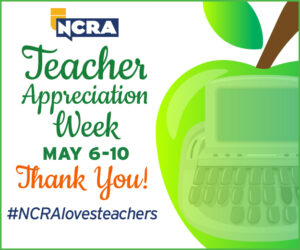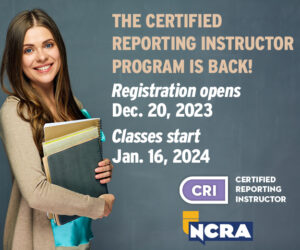By Katherine McNally
When embarking on the adventures found in court reporting school, everyone comes in with their own set of great expectations. In the almost 20 years of teaching and the four years of being a student myself, here are just some of the great expectations I have heard:
- I am going to finish in a year.
- I am not going to be the 90 percent that drop out.
- I want to make a better life for my children.
- I want to teach court reporting.
- I want to set my own hours and work when I want to.
- I want to be able to work from anywhere.
Recently my students and I watched a YouTube video titled “Will Smith Shares His Secrets of Success.” In the video he says: “Being realistic is the most common road to mediocrity.”
As court reporters in training, many people try to convince you that you need to be realistic about this profession. They may say: Isn’t this a dying profession? Aren’t you going to be replaced by tapes, video, electronic recording, or voice recognition? When are you going to be done with school? I have even had students tell me that they have had teachers in the past who insinuated that they didn’t have what it takes to be successful in this field.
One of my great expectations for my students is to believe that they have great careers waiting for them. But it is incumbent upon the student to put in the time and focus and passion that it will take for them to become successful. The field of court reporting is populated by a unique breed of people. They are people who made a decision to become one of a small group of people who can learn a new language that sounds like English when you speak it but looks like steno when you read it. This new language has to be written at astounding speeds. These individuals can understand people who have accents from around the world, who use parts of speech that are unique to other fields and languages, who have speech impediments or physical disabilities that require machines to help them speak.
As students, I would ask that you set great expectations for yourselves. Find that reason that you signed up for a class in court reporting, dust it off, and set it up on the highest shelf alongside your other trophies in life. Practice what you don’t know with an intensity built on a desire to be the best in your field. Don’t accept others’ opinions or limitations on what you can or should be. And, most of all, don’t be mediocre in your own expectations of yourself.
Katherine McNally, CRI, CLVS, is a court reporting instructor at Bryan University, which is based in Tempe, Ariz. She can be reached at katherine.mcnally@bryanuniversity.edu.
















